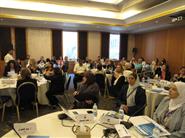Date : 07/10/2025

BEIRUT, Oct 7 (KUNA) -- A Lebanon-hosted workshop on Tuesday looked into the rights of elderly and disabled people around the wider Arab region, allowing participants the chance to immerse themselves into the pressing matter.
"Dare to Care," described as a "groundbreaking regional program," aims to alter social norms and advance gender equality and women's economic empowerment in the Arab region, the program's manager and head of the UN Women's office for Arab states Rodrigo Montero Cano told the gathering in the Lebanese capital.
He spoke of how societies are not "measured" on poverty rates, rather, on how elderly and disabled people are treated, underlining that in spite of their shortcomings, this segment of the population is capable of "successfully" contributing towards economic development and prosperity, added the official.
In a sign of an evolving "demographic landscape" around the world, he pointed out that the number of people over the age of 60, the lion's share of whom are women, is expected to double by the year 2050, which in turn, requires greater attention to their social needs, he said.
Offering her input on the matter, Dr. Fadia Kiwan, the director general of the Egypt-based Arab Women Organization, said that women's rights are often diminished in comparison to their masculine counterparts, citing household chores and family obligations as factors that impeded their entry into the job market.
On efforts to support elderly and disabled rights, in addition to women's empowerment measures, the official said that such backing constitutes a "human rights and gender parity" obligation, which behooves Arab nations to beef up cooperation with regional and international bodies devoted to the matter.
Echoing her sentiments, National Commission for Lebanese Women executive board Secretary and Arab Women Organization executive board member Nathalie Zaarour said that elderly and disabled people are the two social segments that are more in need of support, while assimilating them into society was a measure that represents a "pillar" of sustainable development plans.
Representing Kuwait amid the gathering, UN Convention on the Rights of Persons with Disabilities committee member Dr. Rehab Bourisly underscored the main objective of the workshop, which aims to draw out a "regional roadmap" towards assessing the needs of disabled and elderly people, she said.
Bourisly, who also serves as the second vice president of the Arab Organization for Persons with Disabilities, said that the workshop shines light on the latest "demographic trends" and possible "gaps" when it comes to statistical data on elderly care, while it will also look into success stories dealing assimilation efforts targeting the disabled and elderly.
On progress seen at home over disabled and elderly support programs, the Kuwaiti official underlined national awareness about how these segments of the population are seen as "integral partners" in national development plans and strategies, explaining in her lecture that they are the beneficiaries of a wide array of state services.
The workshop looks into the success of governments worldwide in their effort to offer support for the elderly and disabled, while also taking into account how the use of cutting-edge technology and emerging tools can contribute towards keeping such initiatives afloat. (end)
ayb.nam